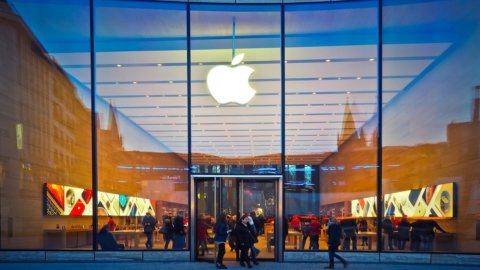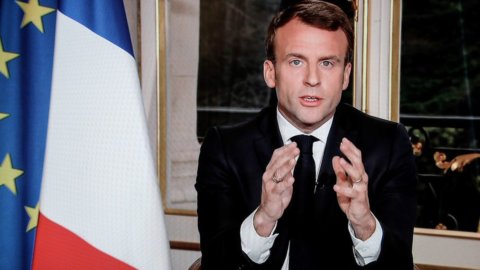MEDIOBANCA, THE MARKET BETS ON IT: TOD'S SCARPARO'S FOOTBALL WILL BE THERE
Counterpass. This morning, thanks to the small wave of speculative purchases on Mediobanca, the capitalization of Piazzetta Cuccia rises to 2.585 million. A very low level, which was affected by the drop in share prices over the past year in the order of 46%, despite the abundant 8% rebound since Wednesday. But the "jump" gives Alberto Nagel a little satisfaction: Mediobanca returns to capitalize a hair more than Diego Della Valle's Tod's, dropped in two days to 2.566 million.
In short, the rumors about Della Valle's purchases of Mediobanca are good for the bank, much less for the made in Italy ship. And yet, for now, the only real indication of warlike intentions on Don Diego's part lies in the sincerity shown by him and only by him, when it comes to slamming the door both by the RCS pact after the reorganization of the board of directors which he defined as "the completion of a badly cooked omelette" that after the defenestration of Giovanni Perissinotto, guilty of disobedience towards Mediobanca: either for his friendship with Roberto Meneguzzo di Palladio, or for the declared intention of wanting to sell the share in RCS, as appreciated by Della Valle who had resigned after the distrust of Prissinotto.
E, as regards via Solferino, the owner of Tod's certainly does not share Nagel's opinion (“we took three steps back”). On the contrary, a "scandalous method" was followed for the appointments, said the owner of Tod's after the decisions imposed by Renato Pagliaro and John Philip Elkan. “Rizzoli is not a game room where one has fun and comes up with impromptu ideas”. It is easy to imagine, in the light of those statements, how Don Diego judged the self-acquittal of Alberto Nagel in the interview with La Repubblica ("in RCS we took three steps back"). From this to imagining a raid by the owner of Tod's in Mediobanca, the parlor in which, last October, the shareholders (with the consent of the managers) had promoted the confirmation of Lionella Ligresti in her place on the board of directors, the step is short. But the confirmation, of course, is still not there.
Two considerations remain. Not only is Nagel's position less secure than in the past, but the archaic and baroque structure of the pact cannot withstand the fluctuations imposed by the crisis. The antitrust, the latest example, has just ordered Unipol not to sell the shares of Mediobanca among the shareholders of “area B” as envisaged by the agreement (otherwise the only natural buyer would be Generali). In the meantime, the bank in Piazzetta Cuccia will soon have to get rid of the many Fonsai in stock after the probable "flop" of the capital increase. Not only that: until when will the "new" Generali be able to do without a capital increase that allows them a development policy for external lines, necessary in order not to lose contact once and for all from Allianz and Axa?
In this frame give up the contribution of Della Valle, the only one who has put fresh money into RCS (together with Giuseppe Rotelli) seems like an unaffordable luxury. And Giuseppe Guzzetti and Giovanni Bazoli probably think so too, ready to put their good offices into defending what remains of the Italian nature of the Unicredit-Mediobanca-Generali triangle. Certainly, any initiative cannot ignore the only liquid protagonists of the Italian economy: Diego Della Valle himself, Leonardo Del Vecchio, owner of Luxottica, present both in Generali and on the Unicredit board and perhaps Patrizio Bertelli, financial soul of Prada, from always rival of Della Valle.
Indeed, judging by the numbers, the great reversal of power between the lords of luxury and the managers in grisaille clearly emerges, already masters of the economy, but today in full crisis. Yesterday evening, on the Stock Exchange, the entire Mediobanca was worth 2.446 million euro. Given the economic results, it is understandable why Della Valle is no longer taking lessons from the masters Nagel or Renato Pagliaro, rather than listening to those noble colleagues, such as John Elkann or Giampiero Pesenti, who had the titles in RCS almost for free or who in Piazzetta Cuccia haven't put a penny since the days of the old lira.
For charity, the golden age of luxury is certainly not exclusive to Della Valle, a member of the Unicredit board but also of the Lvmh flagship, Bernard Arnault's colossus which in the first six months of 2012 recorded 1,6 billion in profits. The sector is bursting with health almost everywhere: in the Gucci house or in Bottega Veneta, Italian branches of Ppr or in the Richemont house (Cartier, Van Cleef & Arpels, Montblanc and so on) and even more in the house of the "Chinese" of Prada, listed in Hong Kong with the blessing of Banca Intesa. Not to mention Ferragamo, which has posted an increase of 66 percent since its entry on the Stock Exchange.
The rule, for all, is only one: today the big names in luxury no longer depend on big finance. Conversely, the leaders of the sector can dictate their rules to those who were once the masters of the markets. It happens in Spain, where Inditex (see Zara) is worth more than Banco de Santander; it happens in France, where Arnault and François Pinault compete as patrons, without neglecting their presence in the press. In short, it shouldn't be surprising if the made in Italy aims at the leadership of the system, without inferiority complexes towards the salons that were good. Mediobanca wasted the great opportunity at the time of Gemina, entrusted at the time to the Romiti family (that Italian "vice" of favoring large families...) when it placed the fashion brands and publishing house of via Solferino under protection together. The result, as we know, was bad.





